Products
Product Resources September 2010
Raman spectroscopy systems
Two Raman spectroscopy systems from Thermo Fisher Scientific are available for the characterization and microcharacterization of carbon nanomaterials. The systems, which incorporate the company's DXR Raman system, are designed to provide information about molecular structure and morphology and can be operated by nonspecialist users. The DXR Nanocarbon Microanalysis Package is a complete system configured for microcharacterization, and the DXR Nanocarbon Analysis package is a full system for bulk materials characterization. Thermo Fisher Scientific, Madison, WI;
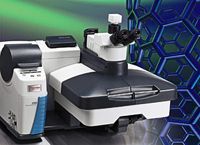
Vacuum UV spectrometer
McPherson's model 234/302 vacuum UV spectrometer includes platinum-coated gratings for use at windowless wavelengths shorter than 120 nm. The 200-mm focal length spectrometer reportedly can be supplied with gratings for use throughout the 30–550 nm wavelength range. The spectrometer also includes windowless cooled CCD detectors and adjustable slits. According to the company, the installed grating can be tuned to longer or shorter wavelengths to collect simultaneous wavelength swaths for general-purpose spectroscopy, plasma physics, and process monitoring. McPherson, Inc., Chelmsford, MA;
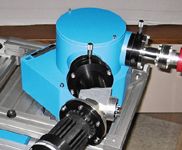
Resonant Raman spectroscopy system
A resonant Raman spectroscopy system from Photon etc. uses a tunable notch filter designed to block elastic scattering over a large wavelength range and maintain a high throughput. The system is coupled to a tunable laser, spectrograph, and an EMCCD camera. According to the company, the system can be used to study vibrational, optical, and electronic properties. Applications include the analysis of carotenoids; pigments and dyes in art, archeology, and forensics; and carbon nanotube properties during growth. Photon etc., Montreal, Canada;
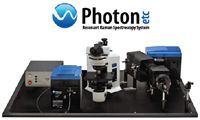
FT-IR spectrometer
The IRAffinity-1 FT-IR spectrometer from Shimadzu Scientific Instruments is designed for high-precision infrared analysis to confirm, identify, and detect foreign matter in various application areas. The compact system reportedly features long-term stability, protection from humidity, increased reliability, and analysis support programs. Shimadzu Scientific Instruments, Columbia, MD;
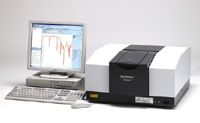
FT-NIR spectrometer
Buchi's NIRMaster stand-alone FT-NIR spectrometer is designed for QC use in food and feed analysis. The spectrometer is available in food-grade polymer and stainless steel housings, both in protection class IP54 and IP65. According to the company, the spectrometer's polarization interferometer provides it with high sensitivity and robustness. The spectrometer includes a built-in PC and calibrations for the food, feed, dairy, meat, and bakery industries. Buchi Corporation, New Castle, DE;
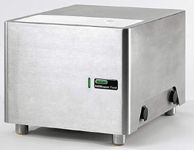
Mercury analyzer
Teledyne Leeman Labs' Hydra IIAA automated mercury analyzer is designed to provide 1-ppt detection limits, fast sample throughput, and high capacity. The analyzer includes a 270-position autosampler and software to automate the analytical process from method development to final report generation. The analyzer performs high-throughput liquids analysis and reportedly can be upgraded to perform direct solids analysis as well. Teledyne Leeman Labs, Hudson, NH;
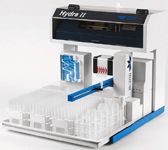
Adjustable objectives
The TECHSPEC Adjustable Reflx objectives from Edmund Optics are available with various magnifications and are adjustable for precision alignment. According to the company, the objectives' finite conjugate design and RMS threading enable them to be integrated into objective setups. Each objective reportedly comes with three coating options for applications requiring high throughput and resolution, such as FT-IR spectroscopy, microscopy, and semiconductor inspection. Edmund Optics, Barrington, NJ;
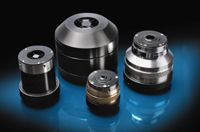
Ion-trap MS system
The amaZon SL ion-trap mass spectrometer from Bruker Daltonics is designed to enhance the productivity and analytical capabilities of laboratories performing structural molecular analyses. The system reportedly features automated software, fast data acquisition at full isotopic resolution in MS and MS-MS modes for use with UHPLC, on-the-fly polarity switching, reproducible fragmentation efficiency, and low maintenance requirements. Bruker Daltonics, Billerica, MA;
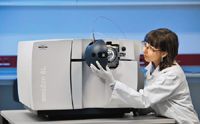
DNA analysis application note
An application note from Thermo Fisher Scientific describes the use of the company's NanoDrop 3300 instrument for studying DNA methylation events and polyamine induced DNA G-quadruplex formations by microvolume fluorometry. The note reviews methods in the current literature in which the instrument enables investigation of complex structures in the field of cancer research. The publication also describes the instrument's cuvette-less sample retention system, which reportedly requires a sample volume of as little as 1 µL. Thermo Fisher Scientific Inc., Madison, WI;
www.thermoscientific.com/nanodrop
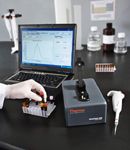
Mid-IR system
The PAIR2 series Double Beam Mid IR spectrometer from PAIR Technologies is designed to provide an analysis time of milliseconds and signal-to-noise ratios better than those of FT-IR spectroscopy. The system collects and stores data using conventional computers, and the data can be analyzed by commercially available software or with customized, user-developed programs. PAIR Technologies, LLC, Newark, DE;
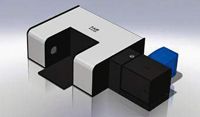
UV–vis–NIR spectrophotometer
The 308 PV UV–vis–NIR spectrophotometer from CRAIC Technologies is designed to be added to an open photoport of a microscope or probe station for nondestructive analysis of microscopic samples. The instrument reportedly can acquire spectra by absorbance, reflectance, luminescence, and fluorescence when attached to properly configured microscopes. According to the company, it can also acquire high-resolution color images of those same samples. Applications include vitrinite reflectance of coal and spectral analysis of minerals, colorimetric and relative intensity mapping of flat panel displays, and thin-film measurement of semiconductors. CRAIC Technologies, San Dimas, CA;

ICP spectrometer
The Prism ICP spectrometer from Teledyne Leeman Labs incorporates the company's C-PAD composite programmable array detector. The instrument includes a long-focal-length echelle spectrometer designed for interference-free measurements with stray light rejection for low detection limits in complex sample matrices. According to the company, the detection system provides access to the 177–900 nm wavelength range and provides independent in-pixel processing to automatically optimize signals for all wavelengths. The instrument is available in axial, radial, and dual-view configurations. Teledyne Leeman Labs, Hudson, NH;

FT-NIR analyzer
The MB3600-CH30 FT-NIR analyzer from ABB is designed for quick biodiesel sample analysis for production monitoring, optimization, and product quality assessment. The analyzer provides a determination of mono-, di-, and triglyceride content; residual methanol; methyl ester %; and other quality parameters in biodiesel for finished product screening and endpoint determination in biodiesel reactors. ABB Ltd., Zurich, Switzerland;
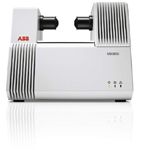
UV–vis spectrophotometer
Agilent's model 8453 UV–vis spectrophotometer uses a photodiode-array detector to make measurements across the 190–1100 nm wavelength range. The instrument's analysis time reportedly is less than 1 s. The spectrophotometer reportedly is coupled with the company's UV-Visible ChemStation software for data analysis, data archival, and compliance with pharmacopoeia requirements and good laboratory practices. Agilent Technologies Inc., Santa Clara, CA;
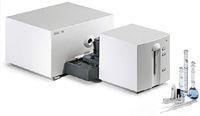
Website
NSG Precision Cells has launched an e-commerce website for spectroscopy cuvettes and other precise quartz optical components. The website provides data, tips on taking care of cuvettes, and an option to order cuvettes online. The company's products include quartz and glass cuvettes for spectroscopy, flow channel cells, microfluidic chips, and other quartz optical components. NSG Precision Cells, Farmingdale, NY;

Food testing application note
An application note from OI Analytical describes the use of the company's iTOC-CRDS isotopic carbon analyzer to measure the Δ13 C carbon isotope signature of foodstuffs for geographical origin authentication testing. The note presents data from carbon stable-isotope tests conducted on honey, maple syrup, and vegetable oil samples along with an explanation of the analysis technique. OI Analytical, College Station, TX;
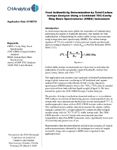
High-speed spectrometers
The AvaSpec FAST spectrometers from Avantes are designed for high-speed uses such as pulsed-laser applications in the UV–vis and NIR wavelength ranges (200–1100 nm). The F-Series is available in four standard configurations, ranging from 0.2-ms to 0.85-ms minimal integration time. The spectrometers are configured in continuous run mode in which a single external trigger results in a continuous scan of spectra up to a user-defined number of scans; they can also be configured in single-scan mode. Avantes, Inc., Broomfield, CO;
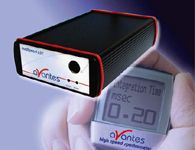
Raman excitation source
The wavelength-stabilized single-frequency A-Type excitation source from Innovative Photonic Systems is designed for use by Raman system developers. According to the company, the source module contains an integral diode laser, TEC, thermistor, laser line filter, and beam-shaping optics and provides a circularized and collimated Gaussian output beam. It also features a linear tracking photodiode for linear output power measurements. Output power reportedly is greater than 100 mW, the spectral linewidth is less than 0.001 nm, and the power stability is less than 0.5%. The module is available at 785-, 808-, 830-, 976-, 1064-, and 1546-nm wavelengths. Innovative Photonic Systems, Monmouth Junction, NJ;
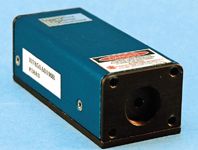
Ratio beam spectrophotometer
The U-5100 ratio beam spectrophotometer from Hitachi is designed for applications ranging from teaching to routine QC, biotech, and environmental testing. The system has a wavelength range of 190–1100 nm, a spectral bandwidth of 5 nm, and LCD screen dimensions of 120 mm × 90 mm. According to the company, it can perform photometry, wavelength scan, time scan, and absorbance ratio measurements. The spectrophotometer includes a six-position automatic cell changer. Hitachi High Technologies America, Inc., Pleasanton, CA;
www.hitachi-hta.com/spectroscopy
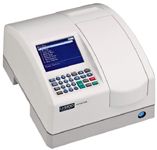
Confocal Raman microscope
The Voyage confocal Raman microscope from B&W Tek is designed to deliver true confocality and flexibility. The microscope is available as a complete system or as an attachment for Olympus BX41/51/61 and Nikon Eclipse 80i upright microscopes. According to the company, the microscope can be equipped with optional laser shields for CDRH class 1a safety compliance. B&W Tek, Newark, DE;

Linear image sensors
Hamamatsu's back-thinned CCD linear image sensors are intended for use with spectrometers. According to the company, the sensors' back-thinned structure provides high sensitivity to UV and NIR wavelengths. The sensors feature a built-in electronic shutter function and a resistive gate structure that reportedly allows readout at up to 10 MHz. The S11155-2048's pixels are 14 µm wide and 500 µm high, and the S11156-2048's pixels are 14 µm wide and 1000 µm high. The devices are available in a 24-pin ceramic DIP package with a quartz glass window. Hamamatsu Corporation, Bridgewater, NJ;

Optical filters
Optical filters designed with sputtered coatings are available from CVI Melles Griot. The narrowband, broadband, and edge filters for fluorescence, microscopy, flow cytometry, and image processing reportedly provide 5–6 OD blocking and maintain a transmission of greater than 98%. According to the company, standard and custom designs are available. CVI Melles Griot, Carlsbad, CA;
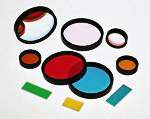
Raman system for inverted microscopy
The XploRA INV compact analytical Ramam chemical imaging microscope from HORIBA Scientific reportedly combines the automatization features and small footprint of a standard confocal Raman microscope with the capabilities of an inverted microscope for biological applications such as cell research, cancer detection, pharmaceutical verification of intercellular activities, inclusion of microreactors, and incorporation of AFM units for tip-enhanced Raman spectroscopy. According to the company, the microscope's open structure permits the use of options and add-ons for inverted microscopes, such as micromanipulators, "optical tweezers," and specific enclosures for cell applications. HORIBA Scientific, Edison, NJ;
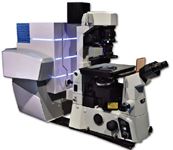
DNA quality control standard
Starna's DNA quality control standard is provided in a 1.5 mL liquid vial that offers the DNACON 260/280 reference material in format suitable for use in drop technology systems. The vial reportedly is produced in an ISO 17025 and ISO Guide 34 accredited environment and provides a NIST-traceable quality control standard. According to the company, the concentration is matched for use with ultralow volume and short-pathlength measurement systems. Applications include DNA purity evaluations in clinical and bioscience laboratories.Starna Cells Inc., Atascadero, CA;
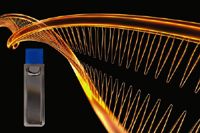
Custom standards
Customized low-level inorganic and organic certified reference materials from SPEX CertiPrep are designed for customers looking for a specific mix of analytes in ppb-level concentrations. The company reportedly manufactures and analyzes all custom mixtures in its cleanroom facilities and is ISO 9001 certified and accredited by A2LA as complying with the requirements of ISO/IEC 17025:2005 and ISO/IEC Guide 34-2000. SPEX CertiPrep, Metuchen, NJ;
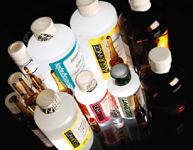
ICP-MS system
The NexION 300 ICP-MS system from PerkinElmer is designed for parts-per-trillion detection of trace elements for diverse applications. According to the company, the system reduces the need for daily user maintenance and cleaning. The instrument reportedly provides three modes of interference removal: Standard, Collision, and Reaction. The modes are designed for simple, routine analyses, semiquantitative analyses, and analyses of difficult elements and matrices, respectively. PerkinElmer, Inc., Waltham, MA;
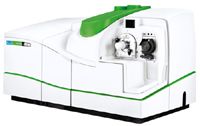
Calibration standards
Hellma's liquid and glass calibration filters for testing spectrophotometers are produced in a DIN EN ISO 17025-accredited calibration laboratory. The accreditation reportedly ensures traceability of calibrations performed to references of NIST, by which an international correlation of measurement results is obtained. Hellma USA, Inc., Plainview, NY;

Mid-IR hollow waveguide accessory
The FlexIR mid-IR hollow waveguide accessory from PIKE Technologies is designed for remote FT-IR sampling. According to the company, the benefits of the hollow waveguides include flexibility, durability, and the capability to cover the mid-IR spectral range with a single probe. ATR, specular, and diffuse reflectance probes are available. Applications include the FT-IR measurement of samples that are not conducive to in-compartment sampling due to physical size or chemical properties and for in-situ IR testing. According to the company, the accessory is compatible with most FT-IR spectrometers. PIKE Technologies, Madison, WI;
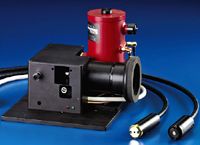
X-ray source
The 40-kV Magnum Reflection X-ray source from Moxtek is designed to be a high output, low-power-consumption device capable of delivering a flux of 2 × 1011 photons/s/steradian/0.10 µA into a large solid angle of 45° at the full width half maximum. The source reportedly provides a focal spot of 300 µm and high energy concentration in the characteristic lines for applications such as high-resolution contrast imaging, quantitative XRF, and qualitative XRD. The source has a reported maximum high voltage potential of 40 kV, a beam current of 0.10 mA, and total power of 4 W. The source operates on an input voltage of 7–10 V dc with a maximum power consumption of 7 W, according to the company. Moxtek Inc., Orem, UT;
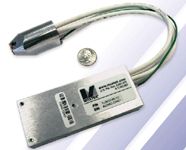
Raman systems
The ProRaman-L systems from Enwave Optronics are designed for high-sensitivity industrial and laboratory Raman applications. The systems feature a 785-nm frequency-stabilized laser, a spectrograph with cooled CCD options from -50 °C to -70 °C, and a high-throughput laboratory fiber-optic probe. The systems reportedly achieve approximately 4.5 cm-1 average optical resolution with various ranges of spectral coverage: ~250–2350 cm-1 , ~100–2200 cm-1 , and ~100–3300 cm-1 . The systems' laser power is ~300–400 mW, with higher output power available upon request. Enwave Optronics, Inc., Irvine, CA;
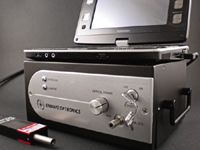
Confocal mapping FLIM system
HORIBA Scientific's DynaMyc microfluorescence dynamics mapping system is designed to provide information about molecular motion, sizes, local environment, interaction, and binding, with discrimination to microscopic locations in the sample. According to the company, the system generates lifetime images more than 20 times faster and can capture complete fluorescence lifetime images in minutes. The system reportedly offers a range of interchangeable excitation wavelengths to match user labels. HORIBA Scientific, Edison, NJ;
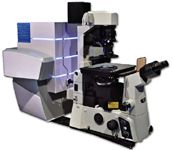
Knife mill
Retsch's GM 300 knife mill is designed for the sample preparation of foodstuffs. The mill has a 4.5-L capacity and a 1.1-kW motor. According to the company, the mill can be used with samples having high water, oil, or fat content, including frozen french fries, pizza, and gummy candies. The mill's grinding chamber and knife can be removed without tools, and all components that come in contact with the sample can be removed and autoclaved. The mill's speed can be adjusted for preliminary or fine size reduction throughout the 500–5000 min-1 range. A digital display can store as many as 10 parameter combinations. Retsch, Inc., Newtown, PA;
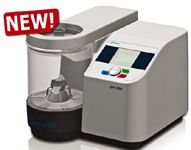
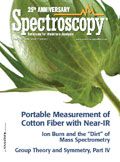
LIBS Illuminates the Hidden Health Risks of Indoor Welding and Soldering
April 23rd 2025A new dual-spectroscopy approach reveals real-time pollution threats in indoor workspaces. Chinese researchers have pioneered the use of laser-induced breakdown spectroscopy (LIBS) and aerosol mass spectrometry to uncover and monitor harmful heavy metal and dust emissions from soldering and welding in real-time. These complementary tools offer a fast, accurate means to evaluate air quality threats in industrial and indoor environments—where people spend most of their time.
NIR Spectroscopy Explored as Sustainable Approach to Detecting Bovine Mastitis
April 23rd 2025A new study published in Applied Food Research demonstrates that near-infrared spectroscopy (NIRS) can effectively detect subclinical bovine mastitis in milk, offering a fast, non-invasive method to guide targeted antibiotic treatment and support sustainable dairy practices.
Smarter Sensors, Cleaner Earth Using AI and IoT for Pollution Monitoring
April 22nd 2025A global research team has detailed how smart sensors, artificial intelligence (AI), machine learning, and Internet of Things (IoT) technologies are transforming the detection and management of environmental pollutants. Their comprehensive review highlights how spectroscopy and sensor networks are now key tools in real-time pollution tracking.